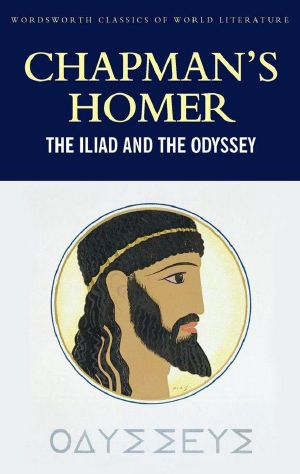The Iliad and the Odyssey (Classics of World Literature)

- Authors
- Homer
- Publisher
- Wordsworth Editions Ltd
- Date
- 2009-06-07T00:00:00+00:00
- Size
- 0.95 MB
- Lang
- en
The Iliad is typically described as one of the greatest war stories of all time, but to call it a war story does not begin to describe the emotional sweep of its action and characters: Achilles, Helen, Hector, and other heroes of Greek myth and history in the 10th and final year of the Greek siege of Troy.
The Odyssey is, quite simply, the story of Odysseus, who wants to go home. But Poseidon, god of oceans, doesn't want him to make it back across the wine-dark sea to his wife, Penelope, son, Telemachus, and their high-roofed home at Ithaca. The story is told in easy-going, beautiful poetry; the characters speak naturally, the action happens briskly. Even the gods come across as real people, despite the divine powers they exercise constantly. Both works have been hailed by scholars and the public for the powerful language that brings clashing, pulsing life to these ancient masterpieces.
The Aeneid is a Latin epic poem written by Virgil in the late 1st century BC (29–19 BC) that tells the legendary story of Aeneas, a Trojan who traveled to Italy, where he became the ancestor of the Romans. "The Aeneid" takes up the Homeric tradition, beginning in the aftermath of "The Iliad" and the Trojan War. Aeneas, protected by his mother, the goddess Venus, is advised to flee Troy with the remaining Trojans. He has been fated to found a greater empire in Italy. Juno, queen of the gods, who supported Greece in the Trojan War, has recently heard that the descendants of Troy will destroy her new favourites in Carthage. All of this raises Juno's ire, and she manipulates men and nature in an effort to end the Trojan line. Through Juno's efforts, and in a manner similar to Homer's "Odyssey," the three day journey from Troy to Rome ends up taking many years.
Tales of Troy is the story of Odysseus, the most renowned of all the heroes the Greek poets have told us of—of Odysseus, his wars and his wanderings. And this story of Odysseus begins with his son, the youth who was called Telemachus.
It was when Telemachus was a child of a month old that a messenger came from Agamemnon, the Great King, bidding Odysseus betake himself to the war against Troy that the Kings and Princes of Greece were about to wage. The wise Odysseus, foreseeing the disasters that would befall all that entered that war, was loth to go. And so when Agamemnon's messenger came to the island of Ithaka where he was King, Odysseus pretended to be mad. And that the messenger, Palamedes, might believe he was mad indeed, he did a thing that no man ever saw being done before—he took an ass and an ox and yoked them together to the same plough and began to plough a field. And when he had ploughed a furrow he sowed it, not with seeds that would grow, but with salt. When Palamedes saw him doing this he was nearly persuaded that Odysseus was mad. But to test him he took the child Telemachus and laid him down in the field in the way of the plough. Odysseus, when he came near to where the child lay, turned the plough aside and thereby showed that he was not a mad man. Then had he to take King Agamemnon's summons. And Agamemnon's word was that Odysseus should go to Aulis where the ships of the Kings and Princes of Greece were being gathered. But first he was to go into another country to seek the hero Achilles and persuade him also to enter the war against Troy.